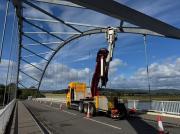Council backs heavier fines for littering and fly-tipping
11th December 2013
The Highland Council is fully backing plans by the Scottish Government to increase fixed penalties for littering and fly-tipping but wants to see more robust action taken against contractors who try to avoid landfill costs by dumping materials indiscriminately.
It agrees that the penalty for littering should rise to Ł80 and the penalty for fly-tipping should increase to Ł200, penalties which are due to take effect from 1 April, next year.
However, on top of the fine for fly-tipping, the Council believes the rogue fly-tippers should also pay for the cost incurred by the Council of cleaning up the mess they leave.
The Council has recently been involved in attempts to locate and prosecute fly-tippers engaged in the construction of new drives. Each piece of work earns the “contractor” significant income.
Councillor Graham Phillips, Chair, Transport Environmental and Community Services, deems the term fly-tipping as a “trivial” description for contraventions of The Environmental Protection Act 1990 S. 33.
He said: “We have been involved in attempts to locate and prosecute fly-tippers, engaged in the construction of new drives. Each piece of work earns the contractor significant income. We believe that the penalty should be applied at a rate equivalent to a loss in the overall transaction. Therefore, if fly-tipping saves an individual business Ł1,000 in disposal costs then the penalty should be commensurate with clean up costs plus the punishment.”
He added: “We need to ensure that we fully enforce a crackdown on littering and fly-tipping. Procurators Fiscal should take more cases to court and penalties must reflect public expectation – the penalty must be greater than the gain.
“For householders, a penalty of Ł200 would be appropriate for fly-tipping a bed, for example, given this could be disposed of free of charge. “
The Council says the national strategy should incorporate a specific view on how enforcement should deal with school age children. It believes a distinct approach should be adopted for 12-16 year old litterers and enforcement should also be developed outwith the strategy.
Councillor Phillips concluded: “The Council will play its part in both education and enforcement and will work with its partners to reduce the blight of litter and fly-tipping.”
Related Businesses
Related Articles
Exciting Career Opportunities With The Highland Council Now Open For Applications
# 10 December 2025 Career opportunities with The Highland Council The Highland Council is looking to fill a variety of posts relating to civil engineering and flood risk management based in locations across the area. Included are opportunities specifically for civil engineering graduates and technicians, providing the ideal job with career progression for anyone recently qualified and ready for a varied and interesting role.
What the NC500 Research Projects Are Designed to Do - and Why They Matter for the Highlands
As the North Coast 500 approaches its tenth anniversary, it has become one of Scotland's most well-known tourism success stories. The 516-mile loop around the far north of the Highlands has been celebrated internationally, marketed as a world-class road trip, and credited with transforming visitor numbers in some of Scotland’s most remote areas.Help Shape the Future of Thurso
The Highland Council is inviting people that live, work, or study in Thurso, to come along to the public consultation events to have their say. This is an opportunity to help shape the future of Thurso, to gather views and ideas.
Are Scottish Councils Quietly Reversing Outsourcing? A Look at Insourcing, Cuts and the Highland IT Shift
A notable article in the Guardian on 6 December 2025 noted the high sums being paid by London councils outsourcing services to private firms. The article starts with the reduction in council funding by UK government since 2010.Council welcomes Visitor Levy flexibility plan
The Highland Council welcomes moves by the Scottish Government to introduce greater flexibility on how it could design a Visitor Levy Scheme for consultation. The Visitor Levy (Scotland) Act 2024 currently provides local authorities with discretionary powers to implement percentage-based levies following statutory consultation.Highland Council is reaching out for views to shape its next 26/27 budget.
As it looks to set out its forthcoming priorities, the council is seeking involvement from members of the public, including businesses, community groups, parents, and young people. All their opinions are going to be crucial in deciding how Highland Council will take on its budget challenge for 2026-2027.Have your say in Thurso's future ÂŁ100million investment by attending public consultation events
Thurso is to benefit from ÂŁ100m investment in education and community facilities and are rolling out the first phase of public consultations on 9 and 10 December 2025. The Highland Council is inviting people that live, work, or study in Thurso, to come along to the public consultation events to have their say; this is an opportunity to help shape the future of Thurso, to gather views and ideas.Finding new owners for empty homes - Scheme launched to help return more empty homes to active use
A new online portal has been launched to bring empty homeowners together with prospective buyers or developers with the aim of facilitating more properties to be used as homes again. Covering the whole of Scotland, this builds on the success of local pilots, referred to as "matchmaker schemes".Consideration for short term let control area in Skye and Raasay
Steps towards introducing a short term let control area have been considered by Highland Council's Isle of Skye and Raasay area committee. On Monday (1 December 2025) the committee heard evidence to justify the grounds for the introduction of a Short Term Let Control Area covering all or part of Skye and Raasay.Workforce North event spotlights Highland economy
EMPLOYERS and educators from across the Highlands have gathered to hear how a new initiative is aiming to transform the region's economy. Workforce North - A Call to Action brought together business leaders and teachers from primary and secondary schools from across the Highland Council area with a wide range of partners geared towards education, learning and skills development at Strathpeffer Pavillion.
